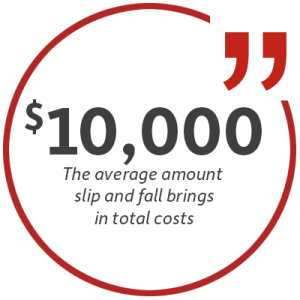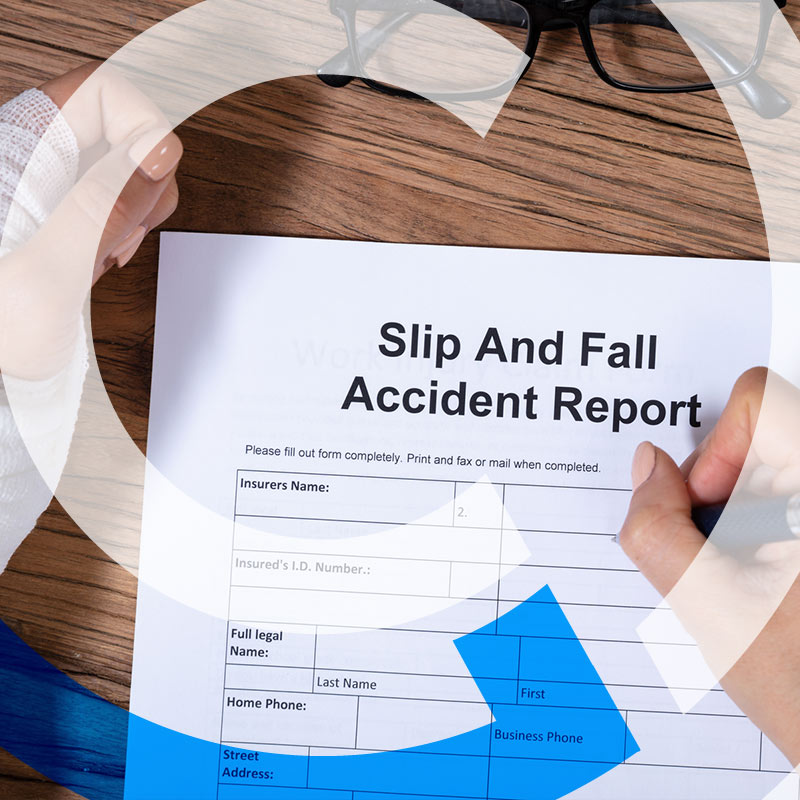All it takes is one dangerous step and you could have a slip that causes severe injury. Some of the most common household causes of slip and fall injuries include ladders, stairs, loose flooring, scattered objects, and uneven surfaces. You may be eligible for compensation if you were injured on HOA property.

Homeowners associations are known for providing beautiful neighborhoods with desirable amenities that enhance a robust community lifestyle.
Unfortunately, not all HOAs are quick to repair property damage or complete routine maintenance on their property and their neglect creates opportunities for injury. When you’re injured on someone’s property. Meanwhile, the bills start rolling in.
Most ER bills are at least $3,000 and the average slip and fall brings $10,000 or more in costs. That’s a large burden to carry alone, especially if someone else might be at fault, which impacts your right to monetary damages.
Who’s Liable for Your Slip and Fall When Injured on HOA Property?

After a slip and fall injury, it’s important to identify who’s responsible for maintaining the area where you were injured. For homeowners who live in communities with homeowners associations (HOAs), this could mean the HOA can be held accountable for maintaining a communal area.
Your HOA is a business organization that has a legally binding duty of care. If the HOA fails to prevent foreseeable harm, there’s a legal process for the injured person. The HOA can be held responsible for harm caused on HOA property.
For example, in a condo community with a homeowners association, the homeowner may be responsible for the area inside their condo and the HOA is responsible for common areas like the parking lot, sidewalks, swimming pools, and landscaping.
If dangerous conditions were present and the Homeowner’s Association failed to fix them, that’s a breach of contract.
The HOA is responsible for addressing a preventable hazard in common areas on association property. Most HOA contracts state clearly what HOA officials are responsible for and when they don’t uphold their end of the contract, it’s a breach of duty.

For example, if you slipped on loose or icy pavement and fell in the parking lot, the HOA might be responsible for paying your medical bills and other damages.
Premises liability means your homeowner’s association is held liable for injuries that occur on their property. Personal injury cases that fall under a premises liability claim don’t have to prove intentional harm. You just have to prove the HOA breached their fiduciary duty to maintain the property.
To hold your HOA accountable and get the maximum compensation from their insurance company, you’ll need an experienced Indiana accident attorney who understands premises liability, homeowners associations, and legal options for your car accident case.
Did The Homeowners Association Protect The Community’s Best Interests?
Reasonable care, within the context of a Homeowners Association (HOA), encompasses the level of caution and consideration for one’s safety and that of others that an ordinarily prudent and rational person would employ in the given circumstances. This standard serves as a subjective measure to determine whether an individual is negligent, based on typical expectations on HOA property. To prove your case you must prove the HOS didn’t exercise reasonable care.
You May Be Able to Sue The HOA for a Breach of Contract
Your first step is to familiarize yourself with your neighborhood’s bylaws, declaration of covenants, conditions, and restrictions (or CC&Rs). These policies are a formal agreement between residents and homeowners, including how they will maintain common areas like sidewalks and the clubhouse.
The HOA must perform its duties in a diligent and good-faith manner.
HOA Must Follow The Rules Outlined in the CC&Rs.

The homeowner’s association’s legal duty is to ensure their property is safe for multiple parties (including adults, children, and pets.) Their goal is to follow legal standards to protect individuals from any unsafe condition that develops on their property.
Let’s say that you tripped over the uneven walkway leading into the community pool and broke your hip. If the HOA is in charge of maintaining that walkway but has put off repairing the uneven pavement, or has mismanaged the funds needed to pay for repairs, then you may be able to sue them for financial compensation.
Another example of negligence could occur when the HOA fails to properly manage its pool chemicals or pool maintenance equipment, and you’re injured by the chemicals, you may have grounds for a premises liability case.
Understanding Premises Liability: How to Hold Your HOA Responsible
Your HOA may try to avoid responsibility for your slip and fall, perhaps pointing to a clause in some paperwork that seems to release them from liability.
Don’t take their word for it. Indiana has strong laws regarding premises liability and you may have a solid case against the HOA.
Crossen Law Firm- Indianapolis Personal Injury Attorneys
The Crossen Law Firm legal team has the experience to handle your Indiana slip and fall case. We care about obtaining results for our clients and we care about you personally. We want to help you secure the compensation you deserve.
Contact us at 317-401-8626 to schedule a free consultation about your case.

 317-401-8626
317-401-8626 
.jpg)